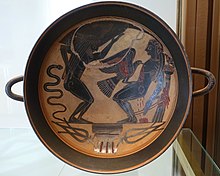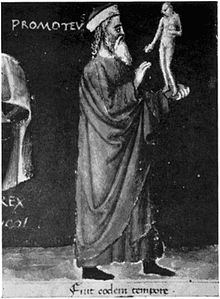Prometheus
![]()
The title of this article is ambiguous. For other meanings, see Prometheus (disambiguation).
Prometheus (Greek Προμηθεύς Promētheús 'the forethinker', 'the forethought'; emphasis Latin and German Prométheus, [pʁoˈmeːtɔɪ̯s] ![]() ) is a figure of Greek mythology The Prometheus saga is among the best-known literary material.
) is a figure of Greek mythology The Prometheus saga is among the best-known literary material.
Prometheus belongs to the deity of the Titans. Like all beings, he is subject to the rule of Zeus, the father of the gods. During an animal sacrifice, he resorts to a ruse to deceive Zeus; he leaves him only the worthless parts of the sacrificial animal and keeps the edible flesh for the humans, since they are his charges. As punishment for this, the enraged Zeus denies the mortals possession of the fire. Prometheus then steals the fire from the gods and brings it to man. Because of this, he is bound by order of the father of the gods and forged in the wasteland of the Caucasus Mountains. There an eagle regularly visits him and eats from his liver, which is then always renewed. Only after a long time does the hero Heracles deliver the Titan from this torment by killing the eagle with an arrow. Finally, Prometheus is pardoned by Zeus and regains his freedom.
As the bringer of fire and the teacher, Prometheus is the originator of human civilization. According to one variant of the myth, as a demiurge he fashioned the first humans from clay and endowed them with properties. However, mistakes were made in the process, the consequences of which are shortcomings from which mankind has suffered ever since. In mythical tradition, one of Prometheus' brothers, the unwise "afterthinker" Epimetheus, who was involved in the work of creation, is held responsible for these shortcomings. Epimetheus causes great harm by getting involved with Pandora, the seductress sent by Zeus, against the advice of his prescient brother.
In the oldest ancient tradition in Hesiod, Prometheus is a cunning and haughty deceiver who is justly punished for his outrage. In contrast, the tragedy The Bound Prometheus, attributed to the poet Aeschylus, paints a very favorable picture of the Titan. The playwright glorifies Prometheus as the benefactor of mankind and the antagonist of the tyrannical Zeus.
Even in antiquity, the fate of Prometheus was an impressive literary subject and a popular motif in the visual arts. Since the Renaissance, numerous poets, writers, painters, sculptors and composers have worked on the material. The myth has also given rise to many philosophical reflections. From the perspective of religious criticism, Prometheus is the archetype of the courageous rebel who initiates liberation from ignorance and religiously based oppression. In modernity, he stands as a symbolic figure for scientific and technological progress and the increasing domination of man over nature. As a result, he is viewed differently depending on one's philosophical position on history: For progress optimists, he represents an allegory of humanity emancipating itself; civilization critics, on the other hand, consider the "Promethean" impulse to be ambivalent or questionable, and problematize man's urge for the most unrestrained, god-like power possible.

The bound Prometheus with the eagle; on the left his brother Atlas (Laconic black-figure drinking bowl by the Arkesilas painter from Cerveteri, c. 560/550 BC, Vatican Museums, Museo Gregoriano Etrusco 16592)
Middle Ages and Early Renaissance
In the Middle Ages, the educated of Western and Central Europe knew relatively little of the myth, because the main sources (Hesiod, tragedy, Plato, Lucian) were not accessible to them; at least some scholars knew considerable parts of the material handed down in ancient manuals. Prometheus was understood as a historical person. He was considered a great explorer, and the first plastic images of the human body were attributed to him. His role as a philanthropic adversary of the deity, which fitted poorly into the Christian worldview, was largely ignored. In mythography, the legend was interpreted symbolically. There Prometheus appears as an exceedingly clever naturalist, and the devouring eagle symbolizes the toil of excessive effort in studying the movements of the heavenly bodies. It was believed that the tale of the theft of fire in the heavens arose because Prometheus had found out the cause of the lightning; thanks to his understanding of this celestial fire, he had introduced the use of fire.
A special case is the scholar Alexander Neckam, who around 1200 wrote a grammatical and lexical manual entitled Corrogationes Promethei (Collections of Prometheus). There he described himself as the new Prometheus; he saw himself as a bringer of culture who, with his work, gave diverse instruction to the uneducated. With this self-description, a man claimed the role of the Titan for himself for the first time. Here we can see the beginning of a development that led to Prometheus becoming a figure of identification, a model for human history and the current lives of people.
In the early Renaissance, the Italian humanists showed interest in the material from about the middle of the 14th century. Francesco Petrarch (1304-1374) knew a version of the myth in which Prometheus is tormented not by an eagle but by a vulture; it is a variant that is already attested in Roman imperial times and was often received in modern times. Petrarch believed that the legend had a historical core, which consisted in the fact that Prometheus had sought out the solitude of the Caucasus in order to solve the riddles of the world in his tireless quest for knowledge. The feeding bird symbolizes the effort of the explorer, which weakens him. This view was shared by Petrarch's friend Giovanni Boccaccio (1313-1375), who in his Genealogia deorum gentilium presented a detailed description and novel interpretation of the myth. Boccaccio assumed a "double" Prometheus, since two different persons were mixed up in the mythical tradition. The first Prometheus was God as the creator of "natural" man. He breathed life and intellect into his creature, but did not impart education to him. Therefore the natural man was ignorant and lived like an animal. The originator of civilization was the second Prometheus, a wise man who decided to end the barbarism of mankind. By the fire was to be understood the clarity of knowledge which this bringer of culture had obtained from God and brought to mankind. With the foundation of civilization he had, as it were, created man anew. In reality, the second Prometheus had not been chained in the Caucasus as punishment after procuring the "fire", but had voluntarily stayed there before his great deed in order to pursue studies in solitude. By the tormenting eagle, he says, is meant the strenuous thoughts with which he had plagued himself there. Boccaccio's consistently positive image of the humanized cultural hero Prometheus proves him to be a forerunner of later Renaissance humanists such as Giovanni Pico della Mirandola, who glorified the spirit of the wise, creative, and insofar quasi-divine man. The writer Filippo Villani, a younger contemporary of Boccaccio, thought similarly. He saw in Prometheus the symbol of the great artist. Visual art imitated nature and was thus a re-creation based on the model of God's work. This idea underlies the ancient legend of the creating Prometheus.
The philosopher Marsilio Ficino (1433-1499), who followed the tradition of ancient Platonism, interpreted the torment of Prometheus, tormented by the vulture, as a symbol of the general situation of man. As an earthly being, man is bound to matter, strives in vain to solve the mysteries of the world, and suffers from his spiritual inadequacy. It is true that man has come into possession of the heavenly fire of reason, but it is precisely this that makes him unhappy, since the ultimate truth nevertheless remains hidden from him. Ficino's patron, the Florentine statesman and poet Lorenzo il Magnifico (1449-1492), expressed a similar opinion. He glorified the mythical Golden Age, which Prometheus had put an end to because he had wanted to know too much. With his intemperate urge to explore, he had disturbed mankind and deprived it of its former happy existence.

Prometheus as Creator. Illumination by Leonardo da Besozzo, 1435/1442. Collezione Crespi, Museo Diocesano, Milan
Text Collection
- Wolfgang Storch, Burghard Damerau (eds.): Mythos Prometheus. Texts from Hesiod to René Char. Reclam, Leipzig 1995, ISBN 3-379-01528-8
Search within the encyclopedia